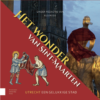NWO VICI: Citizenship Discourses in the Early Middle Ages, 400-1100
1 September 2017 – 31 August 2022
Project
The project-team Citizenship Discourses in the Early Middle Ages studies the heritage of ancient citizenship vocabulary in the post-Roman world until the end of the first millennium. We investigate how ancient Latin vocabulary related to city, citizen and belonging to a community of citizens is re-used in the early medieval West, and how it is there – through a new contextualisation – provided with new meanings. An important focus to our individual projects is the role of Christianity in this process as the new dominant religion.
By studying citizenship terminology in its contextual development, we aim to discover how a continuous use of citizenship vocabulary paired with discontinuities and shifts in meaning developed new discourses of inclusion and exclusion. Our focus is on words, rather than concepts, and on the impact of citizenship terminology in its written and oral performance. What do words do when they denote someone as a citizen and someone else as a non-citizen? How do words employed in strategically developed discourses enable and stimulate the framing and reframing of boundaries and how do they contribute to the formation of communities? How do they also affect individuals, belonging to or being excluded from these communities? These questions are addresses through five sub-projects presented by the team-members themselves.
Read more
Contact
Project leader: prof. dr. Els Rose
Project assistent: Anne Sieberichs BA



